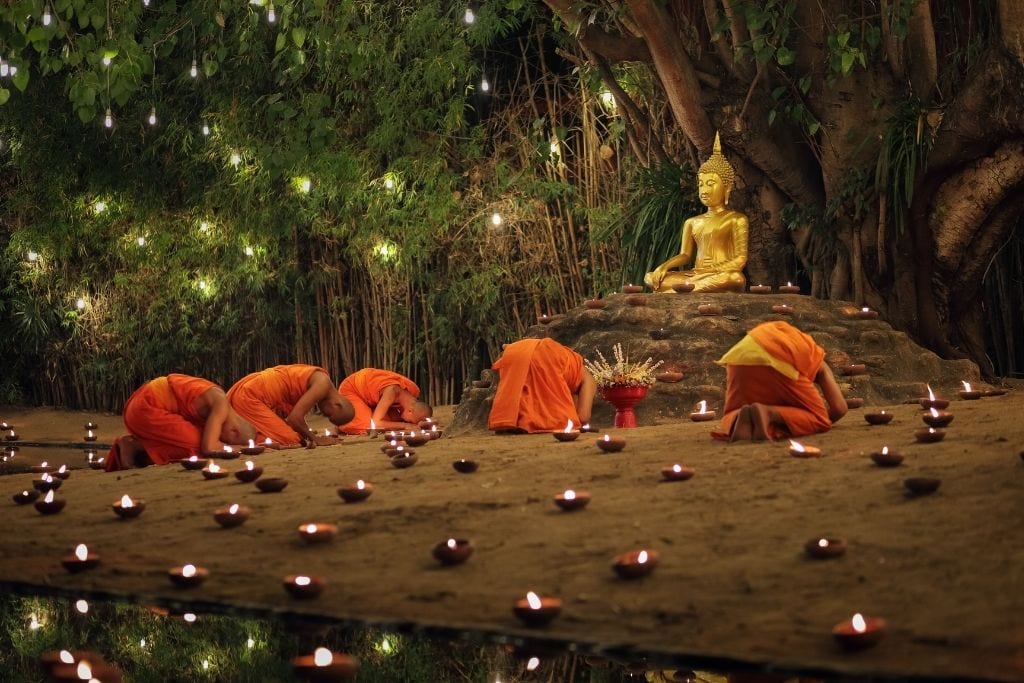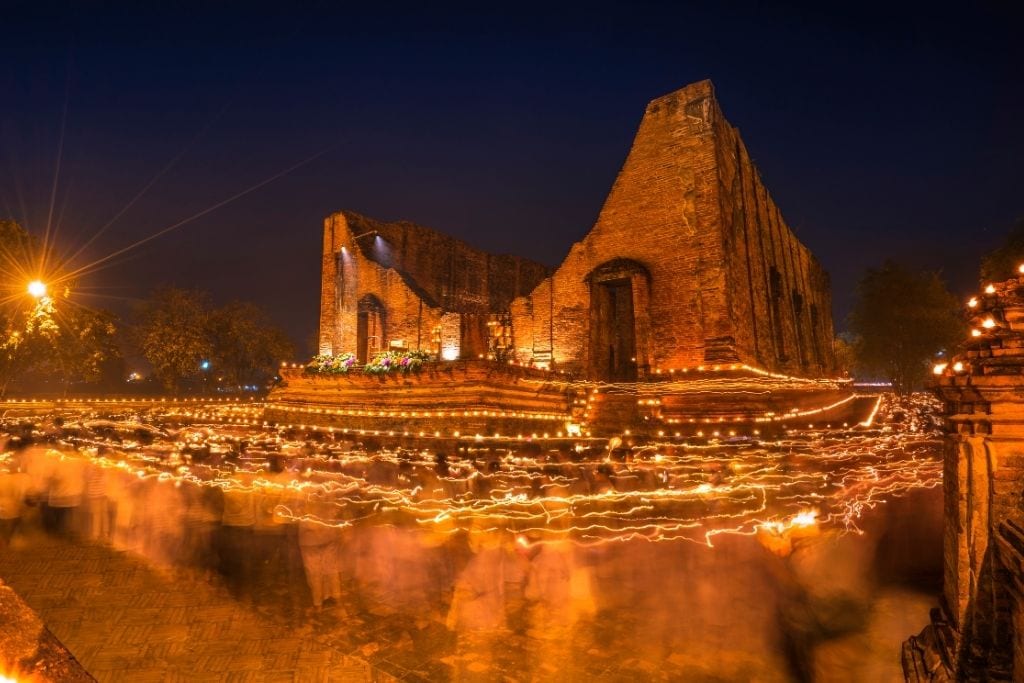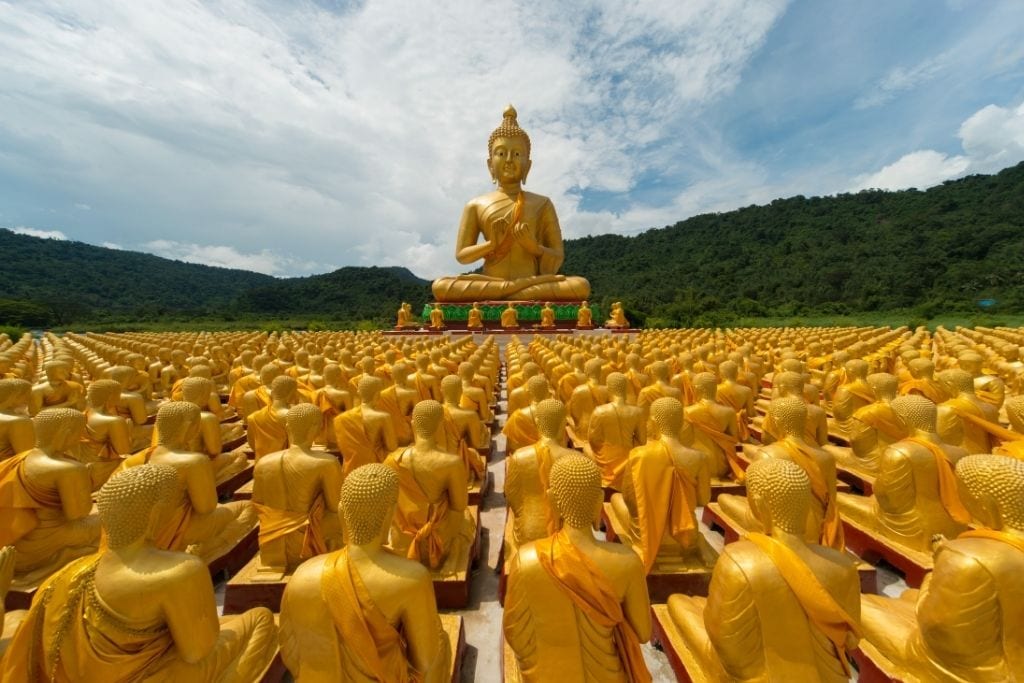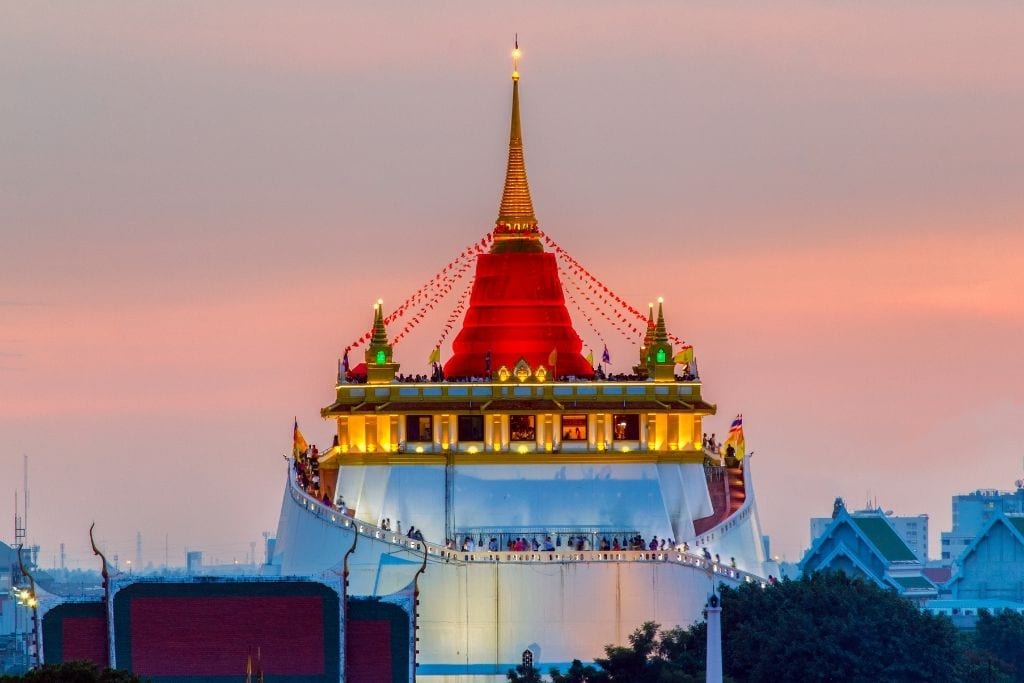Tuk Tuk Tours
Explore Bangkok by the iconic tuk tuk
Buddhist days make up a number of the public holidays on the Thai calendar and among them is Makha Bucha Day. In 2021, Makha Bucha Day falls on Friday 26th February. However, what is the story behind Makha Bucha Day, and how can you observe it while you’re in Bangkok or other parts of Thailand?
Here’s all you need to know about this significant occasion in the varied and colourful Thai Buddhist calendar.

Where does the name for the Makha Bucha Day holiday come from? Well, the Buddhist calendar traditionally used in Thailand is a lunar one. The third lunar month is known in Thai as ‘makha’.
The term ‘makha’ comes from the word ‘Magha’ in Pali, the sacred language of the religious texts of the Theravada strand of Buddhism. Meanwhile, ‘bucha’ is a Thai word – once again deriving from the Pali language. This time from the word Puja – which means ‘to venerate’ or ‘to honour’.
Therefore, the term Makha Bucha refers to a day intended for honouring the third lunar month. Specifically it refers to the Buddha and the teachings that he delivered on the full moon day of the fourth lunar month. Note that in a leap year, Makha Bucha Day may instead be held on the full moon day of the fourth lunar month.

As well as Thailand, Makha Bucha Day is celebrated in other countries including Cambodia, Laos, Sri Lanka, and Myanmar. It first came to be celebrated in modern-day Thailand during the reign of King Rama IV. First observed only in the grounds of the royal palace, but later becoming more widely recognised nationally.
However, the origins of Makha Bucha Day itself lay much further back, 45 years before the beginning of the Buddhist era and nine months after the Buddha is said to have achieved enlightenment. Then, on the full moon day of the third lunar month (now known as Makha Bucha Day), Buddhist beliefs hold that a meeting between the Buddha and his disciplines became a momentous and historic occasion.
Including the fact that it already fell on the auspicious occasion of a full moon. The meeting is said to have taken on four remarkable characteristics that are still recounted in Buddhist teaching today. These four elements to the gathering have also given Makha Bucha Day its nickname of the Fourfold Assembly Day.

A total of 1,250 Buddhist Sangha followers unexpectedly visited the bamboo grove known as Veluvana in Kajangala, northern India. Which is where the Buddha was known to have stayed. Each of the 1,250 was an Arahant, enlightened disciplines who had been ordained by the Buddha himself and who were said to have gained insight into the true nature of existence and have achieved nirvana.
To his unsummoned audience, the Buddha is believed to have given important teaching serving as a summary of the core principles of Buddhism. The teaching is known as the Ovadhapatimokha. Also, it is focused on the idea of refraining from evil, doing what is good, and cleansing the mind.
Buddhists believe that the Buddha continued to teach the Ovadhapatimokha for two decades. It was then taken up by the Buddhist Sangha by way of the 227 rules that make up the monastic discipline code observed by fully ordained monks. As such, Makha Bucha Day is also seen as an opportunity to celebrate the formation of these ideas that continue to guide modern Theravada Buddhism..
The history doesn’t end there, though. 44 years after the Fourfold Assembly on the original Makha Bucha Day, the Buddha is said to have announced that within three months he would die and achieve nirvana. That would happen on the full moon day of the sixth lunar month, now known as Visakha Bucha Day and a Thai public holiday in its own right.
Although Thailand has no official state religion, Theravada Buddhism is by far the majority faith observed by the Thai population. And so significant Buddhist occasions like Makha Bucha Day figure prominently on the country’s calendar. Makha Bucha Day is a public holiday across Thailand. The occasion is observed in a number of ways by lay Buddhists in local communities.
As is common on all manner of Buddhist holidays in Thailand, Thai Buddhists visit their local temple to make merit on Makha Bucha Day. While at the temple, they might listen to Buddhist teachings, give alms to monks, and recite Buddhist scriptures. It is common to participate in an evening candlelight processions around the ordination hall of temples.
Other ways in which practising Thai Buddhists mark Makha Bucha Day in Thailand include strictly observing the five Buddhist precepts for the day. These are not harming living things, not taking what is not given, refraining from sexual misconduct, avoiding telling lies or participating in gossip, and abstaining from alcoholic drinks and recreational drugs.
This is why you might well find that bars in Bangkok and elsewhere around Thailand are closed on Makha Bucha Day. The Thai government restricts the sale of alcohol, albeit inconsistently, on various religious holidays.
In line with the precept to avoid harming living things, strict practising Buddhists also refrain from eating meat on Buddhist holy days. But even those who practise their own looser, more relaxed form of Buddhism might abstain from animal-derived food products on Makha Bucha Day. Indeed, the most deeply religious Buddhists might even take the opportunity of Makha Bucha Day to observe the fuller set of eight precepts.
If you want to get your own insight into local celebrations of Makha Bucha Day in Thailand, simply stop by the local temple closest to you. Most will be happy to welcome inquisitive souls and to let you observe – or even participate.

Some of the best places to observe Makha Bucha in Bangkok are Wat Saket (the Golden Mount) and Wat Benjamabophit (the Marble Temple). At the Golden Mount, there is a procession up to the mount.
Dengan semakin populernya permainan slot online di Indonesia, menemukan platform slot online terbaik di penghujung tahun 2024 menjadi lebih mudah. Berkat perkembangan teknologi digital dan globalisasi dari 88big sunsundegui, menemukan hiburan di internet kini semakin praktis. Slot online khususnya telah menjadi fenomena yang digemari banyak orang di Indonesia. Bagi yang ingin mendapatkan keuntungan besar, hadirnya slot “gacor” (mudah menang) tentu sangat membantu.
Platform slot yang dapat dipercaya archcrown megahoki menawarkan banyak pilihan permainan slot serta menjamin keamanan dan kenyamanan saat bermain. Transaksi, baik deposit maupun penarikan, berlangsung sangat cepat—kurang dari dua menit saja. Ini memungkinkan pemain lebih fokus pada keseruan bermain, tanpa harus repot dengan masalah teknis terkait dana.
Memilih platform slot online yang terpercaya sangat penting bagi para pemain di Indonesia. Platform-platform uncletetsu-ca megawin188 sering menyediakan link alternatif agar pemain tetap bisa bermain meski ada pembatasan dari pemerintah. Platform yang terpercaya secara rutin memperbarui koleksi permainan mereka, menyediakan berbagai pilihan permainan baru dari penyedia game terbaik. Selain itu, banyak bonus dan promo harian yang menarik, membuat pengalaman bermain jadi lebih menyenangkan dan menguntungkan.
Meskipun ada beberapa situs slot yang menjanjikan kemenangan 100%, klaim tersebut tidak selalu dapat dipercaya. Namun, platform slot indonesia terpercaya megawin188 oscarmarcos menyediakan permainan berkualitas tinggi dari penyedia ternama. Berikut beberapa game slot paling populer dari beberapa penyedia terbaik:
Pragmatic Play mega288 robertocipresso adalah salah satu penyedia slot paling populer dengan lebih dari 500 permainan slot yang tersedia. Siap merasakan sensasi bermain slot online? Kini saatnya bergabung dengan ribuan pemain lainnya yang menikmati serunya permainan ini. Game-game ini dikenal dengan pengalaman bermain yang menarik dan jackpot besar. Beberapa game yang paling sering dimainkan meliputi:
Sekitar 60% pemain slot mengklaim bahwa slot dari Pragmatic Play menawarkan peluang menang yang paling baik.
PG Soft menyediakan sekitar 330 permainan slot dengan fitur menarik dan peluang jackpot mega338 sanchezreparaciones yang mudah. Banyak pemain menyukai penyedia ini karena bonus-bonus yang tersedia saat bermain. Beberapa judul populer dari PG Soft adalah:
Hampir 55% penggemar slot mengatakan mereka menyukai game PG Soft karena desain yang mudah dimainkan dan bonus yang sering muncul.
Slot dari Habanero terkenal dengan desain yang menarik dan pembayaran yang besar. Salah satu game yang paling sering dimainkan di oakwine megahoki adalah Koi of Gate, yang dikenal karena peluang jackpotnya yang tinggi. Mengumpulkan tiga simbol ikan Koi dapat memberikan kemenangan hingga puluhan juta rupiah.
Sekitar 45% pemain melaporkan bahwa slot Habanero memberikan pembayaran yang signifikan, menjadikannya pilihan populer bagi mereka yang mengincar kemenangan besar.
Akhir-akhir ini, banyak situs slot online di Indonesia yang sulit diakses karena adanya pembatasan terkait aktivitas perjudian. Namun, platform slot online terpercaya mega777 4pm selalu menyediakan link alternatif agar pemain tetap bisa menikmati permainan mereka tanpa hambatan. Dengan adanya link alternatif ini, pemain tidak perlu khawatir kehilangan akses ke game favorit mereka.
Kesimpulannya, bermain slot online bukan hanya soal keseruan, tetapi juga soal memastikan Anda bermain di platform yang aman, terpercaya, dan juga tips deposit slot yang aman. Baik itu permainan dari Pragmatic Play, PG Soft, atau Habanero, Anda akan menemukan beragam slot yang dirancang untuk menghibur dan memberikan peluang kemenangan. Dengan transaksi cepat, permainan penuh bonus, dan link akses alternatif, platform slot online terbaik di Indonesia menawarkan pengalaman bermain yang tak tertandingi bagi semua pemain, baik yang baru maupun berpengalaman.
At Expique our mission is to help people discover the real Bangkok (and beyond) and the local cultures. We do this through a combination of offering our own award winning tours and through producing informative content.
Our range of experiences in Bangkok including our award winning Bangkok Night Lights Tuk Tuk Tour and our foodie extravaganza Evening Food & Tuk Tuk Adventure.
Subscribe to our newsletter to receive monthly news and tips about exploring Bangkok.
Photos by John Shedrick and Johan Fantenberg